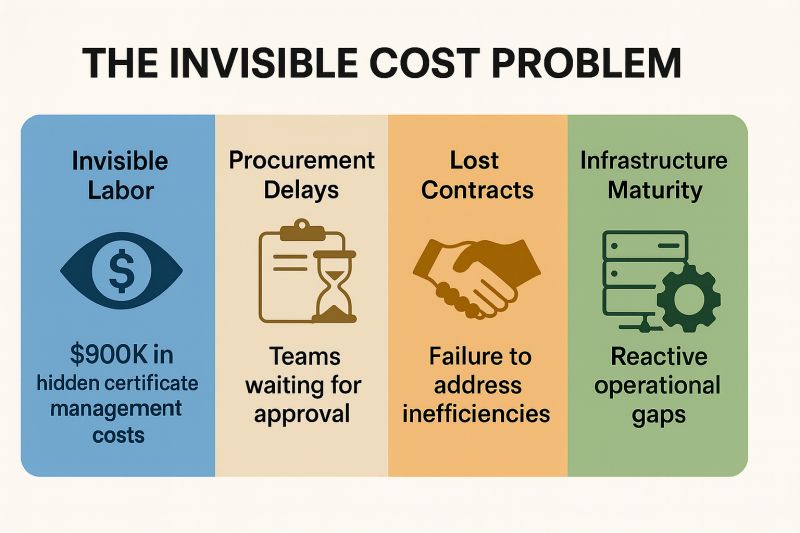The $900,000 Problem Killing Student FinTech Deals
 The student FinTech opportunity is compelling, but certificate management challenges kill deals in final procurement rounds.
The student FinTech opportunity is compelling, but certificate management challenges kill deals in final procurement rounds.
The student FinTech opportunity is one of the most compelling markets I’ve seen in years. Students are struggling financially, universities are actively seeking solutions, and the need is urgent. Yet promising startups keep losing deals in final procurement rounds—not because their product isn’t good enough, but because of something most founders don’t even know matters: certificate management.
The Invisible Cost That’s Bleeding Your Startup
For a startup managing 500 certificates annually, there might be $900,000 in invisible labor costs that never appear in any budget report. Engineers are fully employed, ostensibly doing technology work. Finance sees full productive headcount utilization. Everything looks fine on paper.
But examine what work is actually being done—administrative coordination versus strategic development—and the waste becomes clear.
Certificate management doesn’t fit any traditional “cost center” categories. Instead, it manifests as:
- Fragmented labor costs spread across dozens of engineers
- Delayed project timelines when teams wait for certificate approvals
- Context-switching overhead when engineers pause strategic work for administrative tasks
- Opportunity costs as your most capable people handle renewals instead of building features
Each individual instance appears trivial. Thirty minutes here, a minor delay there. But context switching turns each instance into a half-day loss. Across hundreds of renewals annually, these “small” inefficiencies compound into a major operational burden. Your most capable engineers are handling certificate renewals when they should be building features that reduce student financial stress.
Because these costs are scattered and never consolidated, they remain invisible to leadership. The invisible costs you can’t see are the costs you can’t address.
Why Procurement Questions Kill Deals
When universities ask for your certificate inventory, they’re not checking a compliance box. They’re evaluating whether you understand your own infrastructure well enough to operate reliably at scale.
Can you prove your systems won’t crash during registration week when thousands of students need access? One expired certificate during finals week could lock thousands of students out of payment systems or emergency financial resources. Universities can’t risk student success on vendors who don’t understand their own infrastructure.
This is the gap between “brilliant product” and “contract-ready vendor.” Founders have the capability to build systematic certificate management from day one. They just don’t know it matters until procurement asks. By then, it’s often too late.
What Certificate Management Reveals About Operational Maturity
Certificate management reveals everything about operational maturity.
Organizations with systematic approaches demonstrate:
- Cross-team coordination
- Clear ownership structures
- Automated monitoring
- Proactive renewal processes
Organizations managing reactively signal operational gaps that become disqualifying during institutional procurement. Not because the product isn’t good enough, but because operational readiness determines which startups actually get to serve those students.
The Startups That Win
The startups winning university contracts are the ones that made this invisible cost visible before procurement asked for documentation. These successful startups built systematic certificate management into their architecture from day one.
They can produce complete inventories instantly because they’ve been tracking all along. They treat infrastructure visibility as a product feature from the beginning. They demonstrate the infrastructure intelligence that procurement teams require—operational maturity that’s essential to support the technology needed for a positive student experience.
The Bottom Line
The student-relevant FinTech market is ready. The need is urgent. But operational readiness determines which startups actually get to serve those students.
For startups pursuing university contracts or preparing for acquisition, infrastructure visibility isn’t a nice-to-have. It’s the difference between closing deals and watching opportunities disappear in final procurement rounds.
Make your invisible costs visible before they sink your startup—both in hidden expenses and in lost opportunities.



